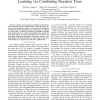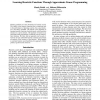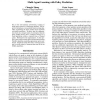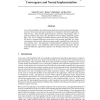1512 search results - page 182 / 303 » Qualitative reinforcement learning |
ROMAN
2007
IEEE
14 years 3 months ago
2007
IEEE
— The ability for people to interact with robots and teach them new skills will be crucial to the successful application of robots in everyday human environments. In order to des...
IROS
2006
IEEE
14 years 3 months ago
2006
IEEE
Abstract— Decision trees, being human readable and hierarchically structured, provide a suitable mean to derive state-space abstraction and simplify the inclusion of the availabl...
AIPS
2008
13 years 11 months ago
2008
Planning problems are often formulated as heuristic search. The choice of the heuristic function plays a significant role in the performance of planning systems, but a good heuris...
AAAI
2010
13 years 10 months ago
2010
Due to the non-stationary environment, learning in multi-agent systems is a challenging problem. This paper first introduces a new gradient-based learning algorithm, augmenting th...
NIPS
2008
13 years 10 months ago
2008
Actor-critic algorithms for reinforcement learning are achieving renewed popularity due to their good convergence properties in situations where other approaches often fail (e.g.,...




